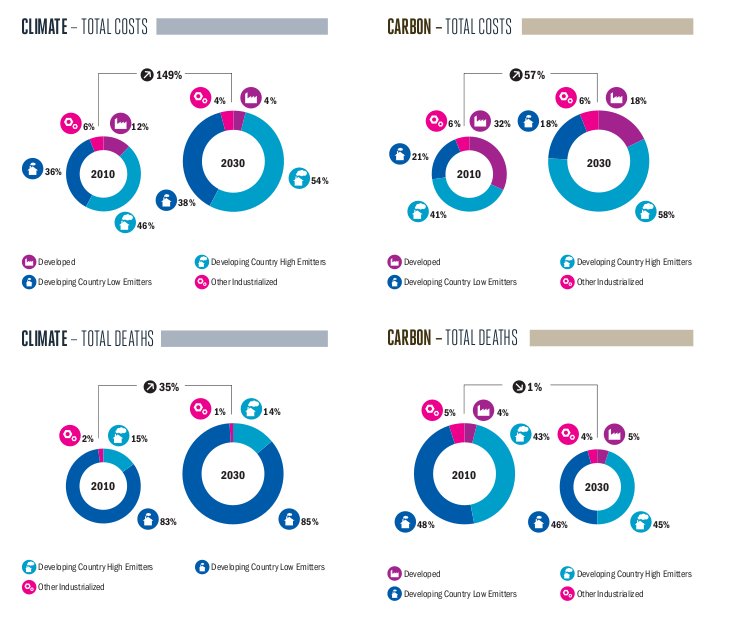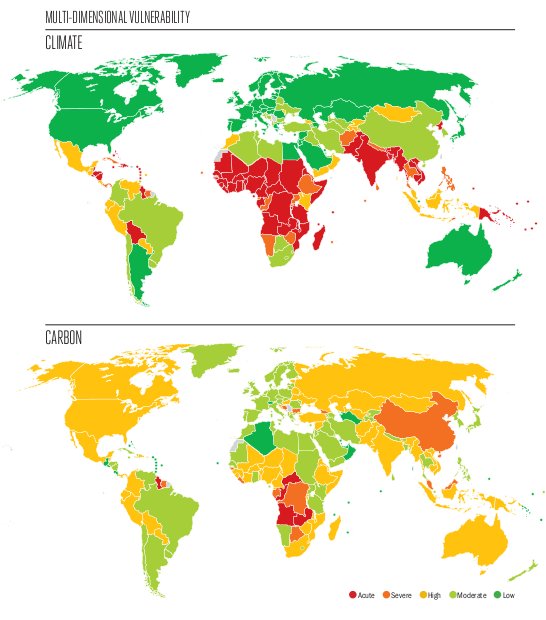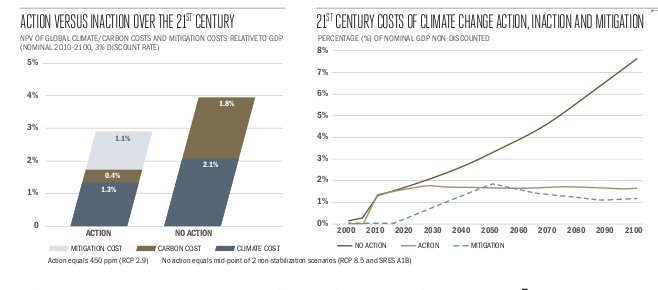There is a conventional view that global action to reduce climate change is a cost to society. But a 2012 Report, Guide to a Cold Calculus for a Hot Planet, outlines how tackling climate change through coordinated efforts between nations would produce much-needed benefits for all, and cost less than sticking with business as usual in the global carbon-intensive economy.
It is based on the work of the Climate Vulnerable Forum, a group of 20 countries highly vulnerable to climate change, who recognise that technical and technological solutions to reduce climate change already exist. They are committed to overcoming the political, social, cultural and financial barriers that stand in the way of solving the problem of human-caused climate change.
Dara, an organisation that provides support in the field of humanitarian aid as well as climate change, disaster and risk reduction, also took part in preparing the Report.
Carbon-based global economy is main barrier to reducing climate change
The main barrier to reducing climate change is the carbon-based global economy, which persists in ignoring the problem. For obvious reasons.
Tackling poverty and climate change simultaneously – within one policy framework that would shift countries onto a low-carbon footing – would create:
- jobs
- investment opportunities
- new possibilities for international cooperation
- deployment of low carbon technologies to everyone’s benefit (well, maybe not to the fossil fuel companies’ benefit)
At the same time, it would lessen the social, economic and environmental damages from the carbon-intensive economy.
This needs to be done world wide. The Report argues that.
“…strong measures on climate change would reap the most monetary benefits for society…building global partnerships where all nations can fully participate in the transition to a low-carbon economy will lessen costs and heighten the social, environmental and economic dividends for all.”
The Problem
This by now is pretty familiar – two decades of climate change policies have failed decisively and the window for reducing climate change is quickly swinging shut. The root cause is that the the world economy is still carbon-intensive. Unless decisive political action is taken to decarbonise the world economy, fossil fuel extraction and consumption will continue its rapid growth in the coming decades. By which time the planet is likely to fry.
The Report points out:
“Current frontline stockpiles of hydrocarbons – of oil, coal, and gas – are multiples of what could possibly be consumed this century if the climate is to be kept under control, despite being valued as if all and more of these will be burnt.”
Costs of climate change, and who’s paying
The people who are paying for climate change with their lives are not the people who are creating the problem. The Report estimates that 5 million lives are lost each year nowadays, as a result of the climate change caused by a carbon-based world economy.
The Report finds that climate change has already set back global development by close to 1% of world GDP. The costs are unevenly distributed across the world.
“Inaction on climate change cost Least Developed Countries an average of 7% of their GDP for the year 2010 –with losses that will greatly increase in the years ahead.”
Climate change is occurring at different rates and to different extents in different parts of the world. For example, the world as a whole is just one degree Celsius (1.8° F) hotter than prior to fossil fuel-driven industrialization – the principal cause of climate change. But Ghana, a focus country in this report, has warmed faster than others. In just 50 years, the number of very hot days in Ghana has increased by 50 in number. Inaction on climate change would see Ghana experience three to five times that increase in heat this century alone.
The costs of making the transition to the low carbon economy are less than the costs of business as usual
The Report finds that the losses incurred from human-caused climate change already significantly exceed any costs of reducing emissions through a transition to a low-carbon economy.
“Action on climate change would therefore already reap monetary benefits for the world, both globally and for major economies like the US, China and India.”
Tackling climate change is already sensible in economic terms today. It will also:
- minimize widespread illness and mortality caused by climate change
- bolster the fight against poverty
- help to safeguard and restore steeply declining biodiversity (the variety of living things)
How this Report differs from previous cost/benefit studies of making the transition to a low carbon economy
Generally, previous studies largely understand climate change as a net benefit or minimal cost to society today, at the present moment. Their use of old data about climate change and its effects underestimate the costs of climate change. And insofar as the studies inform current economic decision-making on climate change, they make it easier for governments to avoid serious action.
This study is distinctive in three key ways.
First, it draws on the most recent science and research into different climate-related impacts,
“taking advantage of the incredible growth in understanding on this issue since the 1990s era research that provides the basis of almost all other studies of this kind”
Second, building on freshly available research allows the report to consider a range of new effects of climate change: chiefly, the fact that increasing heat reduces labour productivity. Workers (especially outdoors) produce less in a given hour when it is very hot.
“Fractional increases in global temperature can translate into tens of additional hot days with each passing decade. Labour productivity is estimated to result in the largest cost to the world economy of any effects analysed in this report.”
The Report also takes into account other newly- identified impacts of climate change, including:
- the thawing of permafrost in cold regions
- the accelerated depreciation of infrastructure that results as frozen land shifts when it thaws
Third, this report looks at the costs and benefits of the carbon economy, independent of any climate change impacts. Carbon-intensive economies impose large-scale costs that have nothing to do with climate change. These include hazards to human health, the environment and economic sectors, such as the fisheries industry. Taking these into account shows the full costs of business as usual – in terms of not moving towards a low carbon economy.
To date, the world economy has underestimated the costs of inaction on climate change. Once the true costs of inaction are clear, the decision to move to a global low carbon economy becomes pretty much a no-brainer.
On the basis of the evidence in this Report, business-as-usual impacts of human-caused climate change for this century would be far greater than any costs associated with a transition to a low-carbon economy. They would also bring unthinkable human suffering.
According to the International Energy Agency, the world’s major economies have just five years to make the structural economic transformations needed to “break out of a dead end business-as-usual trap.” If this doesn’t happen,
“ planned investments in high-carbon infrastructure would from 2017 rule out keeping the global temperature rise below the internationally agreed on level of 2° Celsius (3.6° F). Technological barriers no longer hold back the transition. Prolonging change only increases costs.”
The Report’s key message?
“CLIMATE CHANGE HAS ALREADY HELD BACK GLOBAL DEVELOPMENT: IT IS ALREADY A SIGNIFICANT COST TO THE WORLD ECONOMY, WHILE INACTION ON CLIMATE CHANGE CAN BE CONSIDERED A LEADING GLOBAL CAUSE OF DEATH.”
Here’s the downloadable (PDF) Guide to a Cold Calculus for a Hot Planet.



